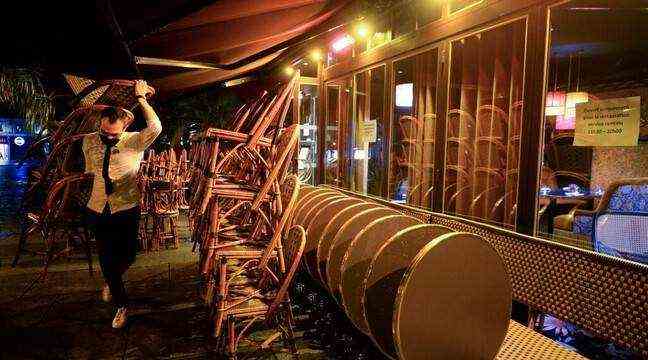The curfew passes to 11 p.m. from this Wednesday, June 9 – JEAN-FRANCOIS MONIER / AFP
- This Wednesday, France will enter the third stage of deconfinement.
- On this occasion, the curfew is pushed back and will be in effect from 11 p.m. to 6 a.m.
- A schedule that questions its health impact.
This Wednesday, France begins its third phase of deconfinement, with in particular the reopening of sports halls, casinos, the interior of restaurants and bars (with gauge and distancing). For the occasion, the curfew, which had already been changed from 7 to 9 p.m. on Wednesday, May 19, will be shifted to 11 p.m. this time.
This curfew should normally disappear permanently on June 30, during the fourth stage of deconfinement against the coronavirus. Do these three weeks of curfew at 11 p.m. make any sense, in terms of health? 20 minutes make the point.
Has the curfew proven to be effective?
The government’s flagship measure instead of confinements since December 2020, the actual effectiveness of the curfew is still subject to debate. It is necessarily difficult to isolate a single measure to establish its impact in the consortium of decisions taken by the executive (closure of bars, restaurants, museums, compulsory wearing of masks, health protocol in schools, etc.), not to mention many other factors that are difficult to quantify (impact of weather and seasonality, respect for barrier gestures by the French, collective immunity which is progressing, vaccination).
So, a german study published on May 3 by the University of Giessen and conducted over the region of Hesse concluded that the curfew was “not an effective measure to limit the transmission of the virus when various other restrictions are already imposed” and that it is not There was “no statistical evidence of the effectiveness of curfews in slowing the spread of the pandemic.” On the contrary,
a study published in Journal of Infection on the Toulouse region showed that the curfew introduced at 9 p.m. had lowered the incidence, but that once extended to 6 p.m., it had presented “counterproductive effects”, in particular with greater contamination in family homes. Santé Publique France has always been very cautious on the subject, indicating that “the improvement of the epidemiological situation may be partly linked to the implementation of the early curfew”.
For the doctor and epidemiology researcher Michaël Rochoy, the results are nuanced: “As with any very contagious disease, limiting gatherings necessarily has an impact. It is very likely that the curfew therefore partly limited possible outbreaks. On the other hand, there is the question of the effectiveness of this measure compared to its duration and its moral and economic weight on the population. “
A curfew at 11 p.m., what impact can that have?
Following the previous logic, “the more we delay the time of the curfew, the less it prevents gatherings, the less effective it is,” said Michaël Rochoy. Especially since the later the hour, “the less it is the fragile people – elderly or with serious pathologies – who are likely to be outside”, he recalls clearly. So certainly, young people – since it is them that it is – end up in part by infecting fragile people, an increase in the incidence in this age group having always been followed by an increase in incidence in older populations. However, for the doctor, “the measure is becoming more and more indirect, which raises questions about its relevance, its social cost and its adherence. Already the curfew at 9 pm is very little respected… ”
However, not everything is wasted. “The more we advance in the evening, the more people are at risk of being alcoholic, and therefore of forgetting the barrier gestures by being tactile”, pleads Michaël Rochoy. Especially since from June 11, the Euro football begins, which can give rise – after 11 pm and the end of the matches – scenes of popular liesses in the streets with huge collective gatherings. “The Euro is perhaps the best justification for a curfew at 11 pm,” says the researcher.
There remain two potentially negative health points to this curfew. First, that the evenings at the bar end in apartments after 11 pm, with an increased risk of contamination in an enclosed and narrow place. Secondly, “that everyone wants to go home by public transport at 10:30 p.m. / 11 p.m., creating a compact crowd where it would have been more dispersed and diffused between 10:30 p.m. and 1 a.m. without a curfew”, continues Michaël Rochoy. .
Is the 11 p.m. curfew a symbolic measure?
With so much vagueness about its health efficiency, the question arises of the symbolism of the thing. The curfew is the flagship measure of the government, the one it boasted of the most, highlighting the difference between France and its neighbors who had opted for strict confinement. “We can think that the curfew is not purely withdrawn to keep consistency in the political and health line chosen since December 2020. Moreover, at that time, the curfew was to last until the famous 5,000 cases. per day. France is currently not there yet, but approaching it, lifting the measure on June 30 would be consistent with the December postulate, ”said Michaël Rochoy.
Another symbolism is possible. At a time when there is a certain relaxation of barrier gestures and when it is necessary to inform the first-time vaccinated that they are not fully immunized and that they must continue to be careful, keep a simulated curfew, just like wearing a mask outdoors – again at least until June 30 according to the President of the Scientific Council on Tuesday – can be a painful but effective way to remind people that the coronavirus is still very present and that we must remain vigilant.
One thing is certain according to Michaël Rochoy, its final lifting on June 30 “should not have many health consequences”. Go courage, more than three weeks.

